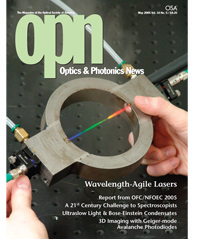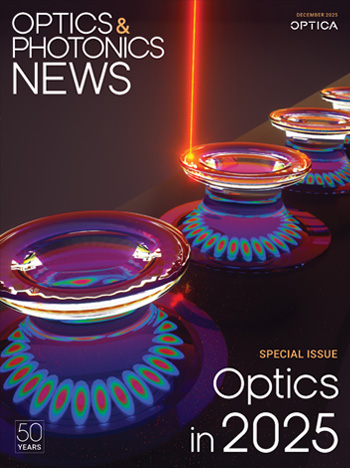
May 2005 Issue
- Report from OFC/NFOEC 2005: Turning Cutting-Edge Optical Technology into Practical Applications
- A 21st Century Challenge to Spectroscopists
- Ultraslow Light & Bose-Einstein Condensates: Two-way Control with Coherent Light & Atom Fields
- Wavelength-Agile Lasers
- 3D Imaging with Geiger-mode Avalanche Photodiodes
- Browse all Issues
Feature Articles
Report from OFC/NFOEC 2005: Turning Cutting-Edge Optical Technology into Practical Applications
The 2005 Optical Fiber Communications Conference (OFC), held March 6-11 at the Anaheim Convention Center, showcased the changing shape of the global fiber-optic industry. Fiber to the home took the spotlight, with talks on the experience of Japanese companies in deploying systems and new technology for cutting costs and improving performance.
by Jeff HechtA 21st Century Challenge to Spectroscopists
The threat of bioterrorism has driven demand for techniques that can detect organisms used in an attack quickly and without the need for prior culture. However, no current technology can rapidly distinguish characteristic microbial components released during a terrorist incident from those in other organisms. Innovations in spectroscopy could provide the necessary tools.
by Alvin FoxUltraslow Light & Bose-Einstein Condensates: Two-way Control with Coherent Light & Atom Fields
Ultraslow light has been used to form dramatic new nonlinear excitations in superfluid Bose-Einstein condensates of laser-cooled alkali atoms, and to create pulsed coherent matter waves. We describe these phenomena and a novel single-atom detector for use in studying the waves’ coherence properties.
by Christopher Slowe, Naomi S. Ginsbery, Trygve Ristroph, Anne Goodsell and Lene Vestergaard HauLasers that can be rapidly scanned through a broad range of wavelengths are under development, primarily for optical sensing. This article describes the characteristics of these lasers, the history of their development and their potential for future applications.
by Scott Sanders3D Imaging with Geiger-mode Avalanche Photodiodes
Laser radar (ladar) systems enable many points in a scene to be resolved to produce 3D imagery. Researchers at M.I.T.’s Lincoln Laboratory have built such ladar imaging systems using arrays of silicon Geiger-mode avalanche photodiodes—which are capable of detecting as little as a single photon of light —and high-speed, all-digital CMOS timing circuitry in each pixel.
by Brian AullDepartments and Columns
Teaching Optics Effectively: An In-Depth Approach
An electrical engineer at Oklahoma State University uses an approach to teaching optics that both educates students and stimulates their interest in pursuing the field in graduate school.
Optics Education and Research in Egypt
An OSA Fellow with a keen interest in medieval Islamic cultures history travels to Egypt to exchange ideas with modern-day optics students and scientists.
Americans Love Science but Don't Know Much About It
A quarter of Americans don't know whether the Earth revolves around the Sun or the Sun revolves around the Earth.
Also in this Issue


![Manual probe system with needles for test of semiconductor on silicon wafer. [A. Morozov / Getty]](https://opnmedia.blob.core.windows.net/$web/opn/media/images/articles/2025/1125/departments/202511-cover-web.jpg?ext=.jpg)
![Researcher Clara Saraceno in the lab. [Image by Carsten Behler Photography]](https://opnmedia.blob.core.windows.net/$web/opn/media/images/articles/2025/1025/departments/202510-cover-web.jpg?ext=.jpg)
